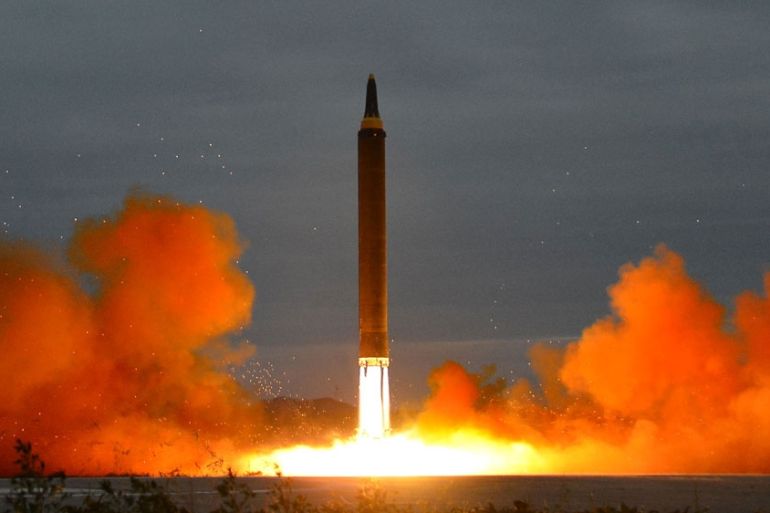Did North Korea really commit to denuclearisation?
Many celebrated a recent resolution issued by Pyongyang as a sign that it will denuclearise. Here is why they are wrong.

Since the Korean Peninsula was divided into North and South, immediately after liberation from Japan in 1945, a tragic saying has become common among South Koreans: “Everybody is irrational whenever encountering any North Korea problem.” The saying reflects the history of love and hate towards North Korea by South Koreans, which has worked like a powerful magic spell.
Never has any South Korean expected that the spell would work on foreigners as well, but astonishingly, the unexpected has happened.
Keep reading
list of 4 itemsIran warns it will change nuclear doctrine if ‘existence threatened’
Russia announces nuclear weapon drills after ‘provocative’ Western threats
North Korea conducts test on new ‘super-large warhead’: State media
On April 21, Ri Chun-hee, a news presenter at the North Korea’s media KCTV, read out a resolution titled “On proclaiming great victory of the line of simultaneous development of economic construction and building of nuclear force”, which had been adopted unanimously at the plenary meeting of the ruling party’s central committee a day earlier.
Quite irrationally, media outlets around the world put up breaking news headlines that North Korea has decided to suspend nuclear and intercontinental ballistic missile tests. Some heads of state rushed to release welcoming remarks on North Korea’s decision, deeming it evidence that the country has committed to denuclearisation.
Some of the media also praised the decision, but interestingly, did not quote, intentionally or not, the title or the text of the resolution. A closer look at the wording of the resolution reveals that North Korea has not really committed to denuclearisation.
So let’s take a look at the text.
The title of the resolution makes it clear that the announcement was made to “celebrate” the great victory of North Korea’s simultaneous development of economic construction and building of nuclear forces (the so-called “byungjin” policy in Korean), not to “pledge” commitment to denuclearisation.
The first paragraph of the resolution says that North Korea has conducted clandestine subcritical nuclear tests even under harsh sanctions. The world knows that it has conducted six underground tests so far, but has had no information about the subcritical tests.
Since relevant United Nations Security Council resolutions have explicitly prohibited any kind of action leading to the development of nuclear weapons, this basically constitutes a confession from the North Korean regime that it violated these UNSC decisions. In making this public, North Korea must have hoped that the clandestine subcritical nuclear tests would be overlooked. In fact, if there is no official condemnation, today, of these tests, in the future, Pyongyang might see it as a sign that it has been forgiven.
The second paragraph declares that North Korea has decided to stop the tests and shut down a nuclear test site. While it may appear a significant step towards denuclearisation, the stopping of the tests is no more than the fulfilment of a precondition for talks set by China and Russia. The text makes mention of a commitment to the treatment of neither fissile materials nor nuclear warheads and the facilities for their production. Moreover, the usefulness of the test site is questionable and the testing site may have suffered negative environmental effects.
The third paragraph hints at North Korea’s possible stance in the upcoming talks with US President Donald Trump. The paragraph states that stopping further nuclear tests is an important part of “worldwide disarmament”. It is important to note here that the North Korean regime refers to “disarmament” and not “denuclearisation”.
In the fourth paragraph, the text says that North Korea will never use nuclear weapons or transfer them, or nuclear technology, under any circumstance, short of a nuclear threat and provocation against the nation. The paragraph is basically its nuclear doctrine and demonstrates that North Korea now perceives itself as a nuclear state.
The fifth paragraph reads that North Korea “will concentrate all efforts on building a powerful socialist economy and markedly improving the standard of people’s living through mobilisation of all human and material resources of the country.” One may argue that this may be interpreted as North Korea giving up building a nuclear arsenal, a pillar of its byungjin policy. On the other hand, it is much more likely that this statement is just a declaration of priority shift after the successful completion of its nuclear project and an expression of the regime’s desire to have economic sanctions lifted.
The resolution concludes by saying that North Korea “will create an international environment favourable for the socialist economy construction and facilitate close contact and active dialogue with neighbouring countries and the international community in order to defend peace and stability on the Korean Peninsula and in the world.” This could, indeed, be perceived as a positive message about the regime’s commitment to diplomacy. But keeping in mind that the North Korean regime almost entirely depends on support from China, which has not pushed for the denuclearisation of North Korea, one has to accept these words with a grain of salt.
Engaging North Korea in a dialogue is indeed crucial but we must not be naive about the intentions of its regime. Misunderstanding the messages coming out of Pyongyang could be a huge obstacle to the success of talks in the long run.
The international community should continue to insist that North Korea return to observing the Treaty on the Non-Proliferation of Nuclear Weapons and commit to genuine denuclearisation.
Editor’s note: The wording of the tenth paragraph of this piece has been updated to clarify a point.
The views expressed in this article are the author’s own and do not necessarily reflect Al Jazeera’s editorial stance.
